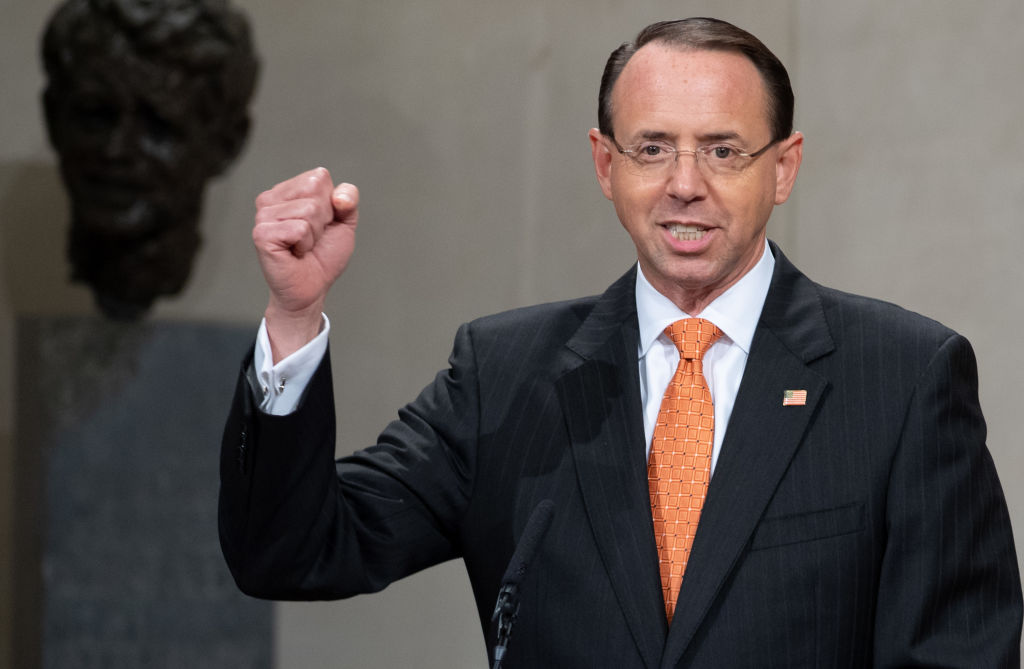Why it matters if Rod Rosenstein is fired instead of resigning


A free daily email with the biggest news stories of the day – and the best features from TheWeek.com
You are now subscribed
Your newsletter sign-up was successful
Conflicting reports emerged Monday about whether Deputy Attorney General Rod Rosenstein had resigned from his post or was on the cusp of being fired. While it's still not entirely clear which is the truth, there's a significant difference between the two.
As Washington Post reporter Aaron Blake explained on Twitter, President Trump has the legal authority to nominate a replacement for Rosenstein if Rosenstein resigns — but his ability to hand-pick a successor is less clear if he fires Rosenstein. The Federal Vacancies Reform Act gives the president the ability to temporarily replace an official if the person in office "dies, resigns, or is otherwise unable to perform the functions and duties of the office," per Politico. Legal experts note that the case of a firing is conspicuously absent from the law.
As Politico noted earlier this year, a similar situation arose when former Veterans Affairs Secretary David Shulkin left the administration. Shulkin himself said he was fired, creating a bit of a stir over whether Trump legitimately had the authority to nominate Robert Wilkie as acting secretary as he did, CNN reported at the time.
The Week
Escape your echo chamber. Get the facts behind the news, plus analysis from multiple perspectives.

Sign up for The Week's Free Newsletters
From our morning news briefing to a weekly Good News Newsletter, get the best of The Week delivered directly to your inbox.
From our morning news briefing to a weekly Good News Newsletter, get the best of The Week delivered directly to your inbox.
Several outlets, including CNN, are reporting that Rosenstein has not resigned and is instead heading to the White House expecting to be fired. Per Justice Department hierarchy, U.S. Solicitor General Noel Francisco would be next in line to assume Rosenstein's role— and would take over Rosenstein's crucial responsibility of overseeing Special Counsel Robert Mueller's investigation into Russian election interference.
A free daily email with the biggest news stories of the day – and the best features from TheWeek.com
Brendan worked as a culture writer at The Week from 2018 to 2023, covering the entertainment industry, including film reviews, television recaps, awards season, the box office, major movie franchises and Hollywood gossip. He has written about film and television for outlets including Bloody Disgusting, Showbiz Cheat Sheet, Heavy and The Celebrity Cafe.
-
 The Olympic timekeepers keeping the Games on track
The Olympic timekeepers keeping the Games on trackUnder the Radar Swiss watchmaking giant Omega has been at the finish line of every Olympic Games for nearly 100 years
-
 Will increasing tensions with Iran boil over into war?
Will increasing tensions with Iran boil over into war?Today’s Big Question President Donald Trump has recently been threatening the country
-
 Corruption: The spy sheikh and the president
Corruption: The spy sheikh and the presidentFeature Trump is at the center of another scandal
-
 Nobody seems surprised Wagner's Prigozhin died under suspicious circumstances
Nobody seems surprised Wagner's Prigozhin died under suspicious circumstancesSpeed Read
-
 Western mountain climbers allegedly left Pakistani porter to die on K2
Western mountain climbers allegedly left Pakistani porter to die on K2Speed Read
-
 'Circular saw blades' divide controversial Rio Grande buoys installed by Texas governor
'Circular saw blades' divide controversial Rio Grande buoys installed by Texas governorSpeed Read
-
 Los Angeles city workers stage 1-day walkout over labor conditions
Los Angeles city workers stage 1-day walkout over labor conditionsSpeed Read
-
 Mega Millions jackpot climbs to an estimated $1.55 billion
Mega Millions jackpot climbs to an estimated $1.55 billionSpeed Read
-
 Bangladesh dealing with worst dengue fever outbreak on record
Bangladesh dealing with worst dengue fever outbreak on recordSpeed Read
-
 Glacial outburst flooding in Juneau destroys homes
Glacial outburst flooding in Juneau destroys homesSpeed Read
-
 Scotland seeking 'monster hunters' to search for fabled Loch Ness creature
Scotland seeking 'monster hunters' to search for fabled Loch Ness creatureSpeed Read
